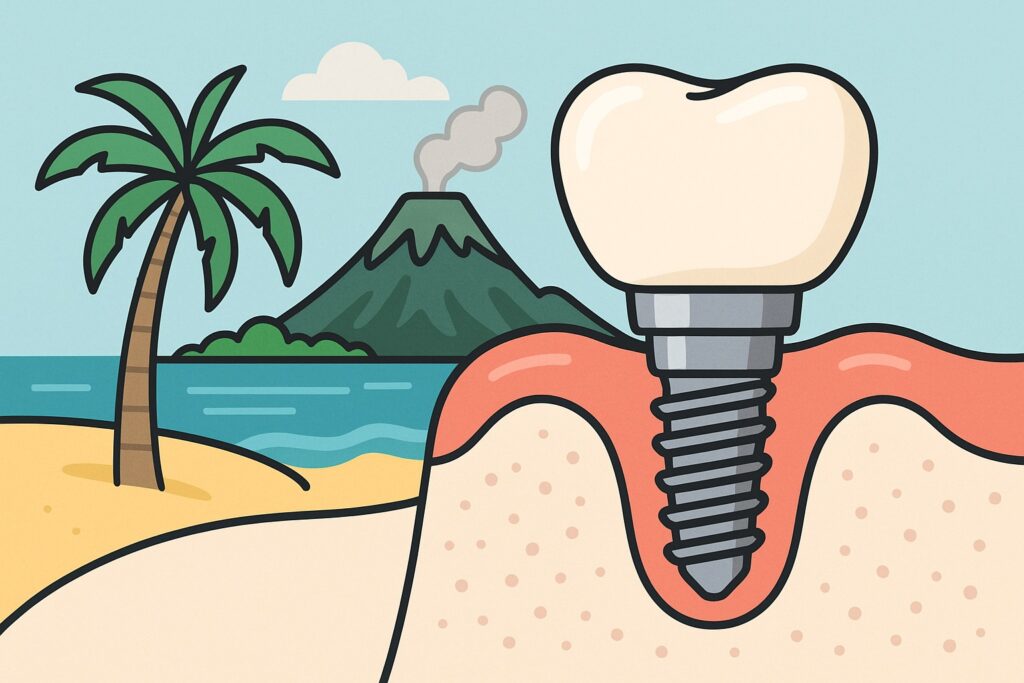Dental implants are expensive in the U.S. and Canada, often costing $3,000–$5,000 per tooth, which pushes many patients to look abroad.
Costa Rica has become one of the top destinations for dental tourism, offering procedures like dental implants at significantly lower prices—sometimes up to 70% less. While the savings are real and many clinics operate to high standards, the decision shouldn’t be based on cost alone.
The biggest risks with overseas dental care usually come after the procedure, when complications arise and your surgeon is thousands of miles away. This post explores the safety, cost, and potential downsides of getting dental implants in Costa Rica, especially regarding post-operative care and what happens if things go wrong.
Why Patients Travel to Costa Rica for Dental Implants
Dental care in Costa Rica attracts thousands of international patients each year, particularly from the U.S. and Canada. The main driver? Cost savings. Dental implants that would cost $3,500 to $6,000 in North America can range from $850 to $1,500 per implant in Costa Rica. For patients needing multiple implants or full-mouth reconstruction, the savings can total tens of thousands of dollars.
But it’s not just about price. Many Costa Rican dentists are trained in the U.S. or Europe and speak fluent English. Clinics in San José and other major cities often promote modern equipment, digital imaging, and even concierge services that coordinate transportation, lodging, and tourism activities.
This blend of affordability, vacation appeal, and perceived professionalism makes Costa Rica a leading hub for dental tourism. However, patients must look beyond marketing and deeply consider the risks tied to traveling for a medical procedure, especially those that can take months to fully heal—like dental implants.
Are Dental Clinics in Costa Rica Safe and Regulated?
Yes, many dental clinics in Costa Rica are safe and operate at high standards—but not all. The key difference lies in regulation and oversight, which can vary widely between clinics.
Licensing and Education Standards
Dentists in Costa Rica must graduate from an accredited dental school and register with the Colegio de Cirujanos Dentistas de Costa Rica (Dental Surgeons College of Costa Rica), the official body that oversees licensure. Some practitioners also receive advanced training abroad, especially in the U.S. and Europe.
Accreditation Matters
Top clinics often hold international accreditations or belong to medical tourism certification programs like:
- PROMED (Council for International Promotion of Costa Rica Medicine)
- Joint Commission International (JCI)
- Clinics advertising ADA-compliant materials and procedures
These credentials indicate adherence to global hygiene protocols, sterilization processes, and quality control standards.
Equipment and Lab Quality
Leading clinics invest in modern technology such as:
- Cone-beam 3D imaging
- In-house dental labs
- Digital treatment planning systems
However, not every provider operates at this level. Some low-cost providers may cut corners with cheaper materials or outdated tools. Patients should always verify whether the implants are brand-name systems (like Straumann, Nobel Biocare, etc.) or unbranded alternatives that may lack long-term data.
So while Costa Rica offers many safe, high-end options, thorough vetting is essential to avoid clinics that fall short of international expectations.
Comparing Quality of Care: Costa Rica vs U.S./Canada
The quality of dental care in Costa Rica can be comparable to that in the U.S. or Canada—but only at the top clinics. Here’s how the two compare across key factors:
Dentist Training and Specialization
Many Costa Rican implantologists have received training abroad, particularly in the U.S., Germany, or Switzerland. Some are members of international dental organizations like the International Congress of Oral Implantologists (ICOI) or the American Academy of Implant Dentistry (AAID). However, not all clinics employ specialists. In contrast, the U.S. and Canada require board-certified specialists for complex implant work.
Materials and Implant Systems Used
High-end clinics in Costa Rica use the same globally recognized implant systems as in North America—brands like Nobel Biocare, Straumann, or Zimmer Biomet. But in lower-cost clinics, it’s not uncommon to find generic or unbranded implants. These may save money short-term but could pose long-term risks in compatibility, availability of replacement parts, or durability.
Treatment Protocols
In the U.S./Canada, implant treatment typically involves a multi-step process with healing periods of several months. In Costa Rica, “immediate load” or same-day implants are sometimes advertised to attract short-stay patients. While this can work in certain cases, rushing the procedure increases the risk of failure if bone density or gum health isn’t ideal.
Patient Experience and Satisfaction
Many patients report excellent experiences in Costa Rica—high-end clinics often provide personal coordinators, private transportation, and luxury facilities. However, reviews also show inconsistent results depending on the provider. Unlike the U.S. or Canada, there may be limited accountability if something goes wrong.
In short, Costa Rica can offer care on par with the U.S.—if you choose the right clinic. The burden of due diligence lies on the patient.
Cost Breakdown and What You Actually Save
One of the biggest drivers of dental tourism in Costa Rica is cost. Patients can expect to save 40% to 70% on dental implants compared to prices in the U.S. or Canada. But it’s important to understand exactly what these savings include—and what they don’t.
Average Price Comparison
| Procedure | U.S./Canada (USD) | Costa Rica (USD) |
|---|---|---|
| Single dental implant (incl. crown) | $3,500–$6,000 | $850–$1,500 |
| Full arch (All-on-4) | $20,000–$30,000+ | $8,000–$15,000 |
Note: Prices vary depending on materials, clinic, and complexity.
What’s Typically Included
In Costa Rica, most dental implant packages include:
- Consultations and 3D imaging (CBCT scans)
- Surgical placement of implant
- Temporary or permanent crowns/bridges
- Anesthesia and medications
- Follow-up during your stay
Some clinics even offer airport transfers and hotel discounts, but this depends on the provider.
Hidden and Additional Costs
Patients often overlook these expenses:
- Flights: $400–$800 round-trip (per person)
- Lodging: $60–$150 per night (for 1–2 weeks)
- Meals and local transport
- Multiple trips: Some procedures require a return visit for permanent crowns
- Emergency care at home if complications arise later
What You Actually Save
Even after accounting for travel, many patients still save $5,000 to $15,000+, especially for full-mouth restorations. But cost savings shouldn’t be the only consideration. If problems arise after you return, that savings can vanish quickly—leading to even higher costs at home.
The Biggest Risk: Post-Operative Complications After You Return
While cost savings and initial results may seem promising, the real risk of getting dental implants abroad often begins after you return home. This is where many patients underestimate the long-term implications of dental tourism—especially with implants, which require healing, monitoring, and occasional adjustments.
Complications Don’t Always Show Up Immediately
Most implant-related issues—such as infection, implant loosening, bite misalignment, or crown failure—develop weeks or months after surgery. By the time symptoms appear, you’re already back home and far from the clinic that performed the work.
No Local Support for Follow-Up
Once you’re home, your Costa Rican dentist is not accessible for hands-on care. You can email or call, but remote support can’t replace in-person exams. If your implant fails, your only options are:
- Flying back to Costa Rica (with added cost, stress, and time off work)
- Finding a local dentist willing to take over—which many won’t, especially if they didn’t do the original work
Local Dentists May Decline to Help
Many U.S. and Canadian dentists are hesitant to treat complications from work done abroad. Why?
- They don’t have your full treatment records
- They may be unfamiliar with the implant system used
- They risk legal liability for work they didn’t perform
If you do find someone willing to help, corrective work is often costly—sometimes exceeding the original savings.
Warranties and Legal Protections Are Limited
While some Costa Rican clinics offer written warranties, they often require you to return to their office to claim them. That means paying for travel and lodging again. Unlike in the U.S. or Canada, you may have little or no legal recourse if something goes wrong.
Insurance Likely Won’t Help
Most dental insurance policies won’t cover complications or corrective procedures from treatment done abroad. You’ll pay out-of-pocket if problems arise.
How to Protect Yourself as a Dental Tourist
Dental tourism can be safe and cost-effective, but only if you take the right precautions. Here’s how to reduce your risk—especially when it comes to post-treatment issues:
1. Research the Clinic and Dentist Thoroughly
Don’t rely on glossy websites or social media ads. Look for:
- Verified reviews from independent sources
- Dentist credentials: Check where they trained and what professional groups they belong to
- Confirm use of recognized implant systems (e.g., Straumann, Nobel Biocare)
2. Get a Written Treatment Plan
Before you travel, request:
- A detailed treatment and pricing plan
- Material specifications
- Time estimates and follow-up details
- Warranty terms (and limitations)
3. Prepare for Aftercare Before You Leave
Speak to a local dentist before your trip. Some will:
- Review your foreign treatment plan
- Offer follow-up care when you return
- Be prepared in case issues arise
4. Know the Risks of Immediate Implants
Same-day implants aren’t for everyone. If your clinic is pushing a rushed procedure without proper evaluation, that’s a red flag.
5. Have a Contingency Budget
Set aside extra funds for potential corrective work at home. Even $2,000–$3,000 can make a difference in an emergency.
Conclusion
Costa Rica has built a solid reputation as a dental tourism hub, offering modern clinics, skilled professionals, and significant cost savings on procedures like dental implants. For many patients, the experience is smooth and the results are satisfactory—if the right clinic is chosen.
However, while the initial care can be safe and high quality, the biggest risk begins after you leave the country. Post-operative complications like infections, implant loosening, or bite issues often arise weeks or months later—when your original provider is no longer easily accessible. Without local follow-up support, you may face high out-of-pocket costs, limited legal protection, and difficulty finding a dentist willing to take over.
Dental tourism in Costa Rica isn’t necessarily unsafe—but it requires serious due diligence, realistic expectations, and a well-prepared backup plan. If you’re considering this route, make sure your decision balances cost savings with long-term peace of mind.

